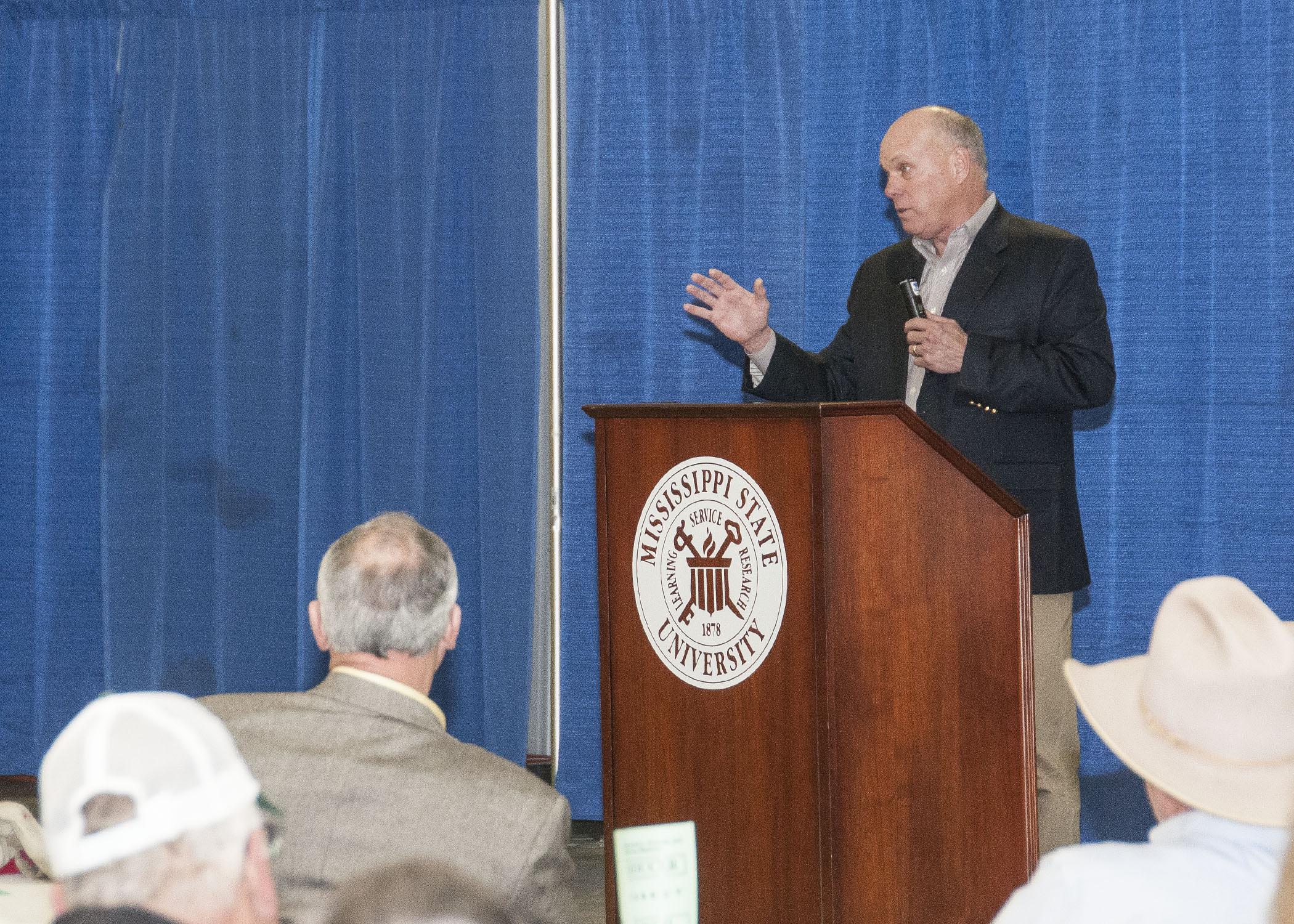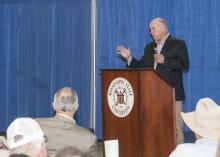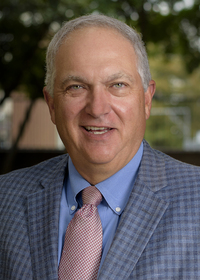Information Possibly Outdated
The information presented on this page was originally released on February 28, 2013. It may not be outdated, but please search our site for more current information. If you plan to quote or reference this information in a publication, please check with the Extension specialist or author before proceeding.
Producer's dictate MSU's priorities
VERONA – When agricultural producers speak, Mississippi State University listens.
About 300 commodity producers, crop consultants and MSU representatives met on Feb. 21 at the North Mississippi Research and Extension Center in Verona for the annual Producer Advisory Council meeting. The meeting has been held for more than half a century to give farmers the opportunity to express agricultural needs to their land-grant institution.
“Mississippi State exists to help farmers and landowners throughout the state,” said George Hopper, director of the Mississippi Agricultural and Forestry Experiment Station and MSU’s Forest and Wildlife Research Center. “This is your opportunity to tell us how we can help you produce your crops.”
Hopper, who is also dean of MSU’s College of Agriculture and Life Sciences and College of Forest Resources, asked farmers to help recruit students to pursue degrees in agriculture-related fields.
“A role of MSU is to produce future agriculture leaders. We need you to encourage the next generation to follow in your footsteps,” Hopper said. “When they come to you and express an interest in agriculture, don’t try to talk them out of it. Send them to us. We will prepare them for career success.”
Steve Martin, newly appointed head of the North Mississippi Research and Extension Center, said the annual meeting provides MSU with the opportunity to share progress since last year’s meeting.
“This meeting gives our researchers and Extension agents the opportunity to respond to growers’ concerns, both during the meeting and in the year to come,” he said. “We also have the opportunity to report accomplishments. It’s a two-way street.”
Mike Sullivan, state farm program director for the Farm Service Agency, and U.S. Congressman Alan Nunnelee spoke to the producers. Nunnelee provided an overview of legislative agricultural concerns, including the new Farm Bill, Environmental Protection Agency issues, the estate tax, minimum wage and sequestration. Following their comments, they stayed to listen to each commodity group’s report.
The following commodity meeting presenters delivered reports:
Aquaculture – Mark Koehn of Chickasaw County requested research to decrease losses caused by Aeromonos, a new disease impacting catfish. The group also requested research on protein amounts in feed based on fish sizes.
Beef – Jacob Megehee of Noxubee County expressed the need for continuing forage research, especially seeking plants with strong root systems that will hold up to cattle traffic pressure. Producers also want MSU’s help in finding a consistent winter perennial to help producers cut down on feed costs. The group requested area educational programs about preconditioning, vaccination programs and handling issues. They expressed the need for more food animal veterinarians.
Cotton – Joe Camp of Itawamba County requested more research on resistant weed management and aggressive monitoring of resistant and nonresistant plant bugs. The group also expressed the need for a cotton breeder to work on varieties for the Hill section of the state.
Dairy – Patrick Gallop of Monroe County reported the need for MSU’s help to stabilize the industry and make it sustainable.
Equine – Eddie Turner of Monroe County requested more efforts to address the College of Veterinary Medicine’s costs and services for horse owners. He said the group is pleased the university is about to hire an equine specialist and requested assistance in promoting equine events and recruiting the next generation for horse ownership and activities.
Forestry and wildlife – Woody Speights, a student at Itawamba Community College, requested more continuing education for landowners and updates on the economics of biomass production. The group wants more emphasis on research and product development.
Fruit/nuts – Gerald Jetton of Itawamba County asked MSU to assist in forming a fruit and nut cooperative to help get local produce into Mississippi schools. Additionally, he requested that the university hire a regional specialist for northeast Mississippi and use the pecan grove at the research station near Brooksville for educational programs.
Goats and sheep – Jimmy Howell of Calhoun County said producers need help establishing a contact system. Special research needs include parasite control and forage issues related to browsing animals. He also requested an agricultural engineer to design a “goat-proof hay ring” to reduce wasted feed.
Grain crops – Bobby Moody of Lee County said the group wants MSU to continue to work with promotion boards to support research on improved varieties and other new products. They specifically requested research on fungicide treatments for corn and wheat and continued research on products containing 2,4-D.
Ornamentals – Tim Burress of Union County expressed a variety of research requests including downy mildew on impatiens, rose propagation through grafting and blight control on English boxwoods. The group also wants guidance on composting hardwoods, as well as lawn and garden materials.
Peanuts – Roy Weathers of Lowndes County asked that MSU place a high priority on hiring a peanut specialist. Because peanuts are a canopy crop, which promote diseases, more fungicide research is needed, specifically on timing of applications. The group requested direct email updates on fungicide research.
Sweet potato – Danny Clark of Calhoun County said tip-rot disease and variety research are two needs for potato growers. They also requested pest management guidance for issues such as nematodes, weeds and insects.
“We need research for ways to add value to nonmarketable sweet potatoes, such as fuels or feed -- anything that will keep us from just dumping unused potatoes,” he said.
Swine – Byron Wilson Sr. of Chickasaw County thanked MSU for its support throughout the years. He asked that MSU reactivate the nutrient management task force, an interdisciplinary group to guide producers in environmental issues. He also asked for research into feral hog control.
Turf – David Rainey of Alcorn County asked that MSU refill the turf specialist position after the upcoming retirement of Wayne Wells. Research needs mentioned included control of Virginia button weed, tensile strength and use of chicken litter for fertilizer.
Vegetables – Ralph Hanskiewiez of Union County requested research on soil disease control, farm-to-school cooperatives, sweet corn varieties for northeast Mississippi, pumpkin varieties for markets and school tours.
The annual meeting is held annually in Verona on the third Thursday in February.



